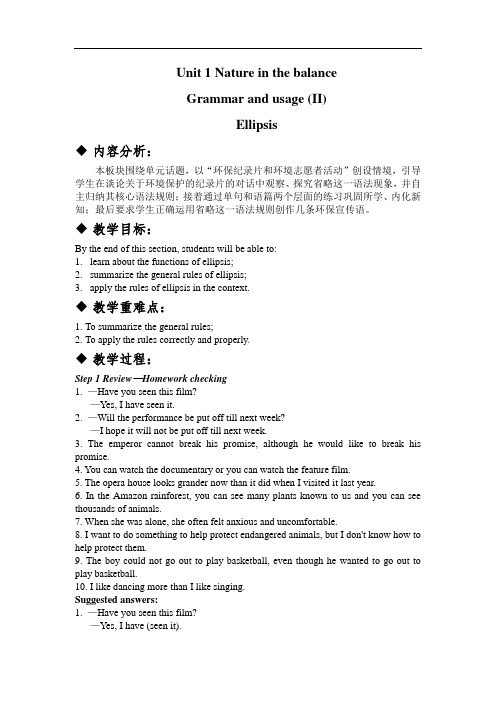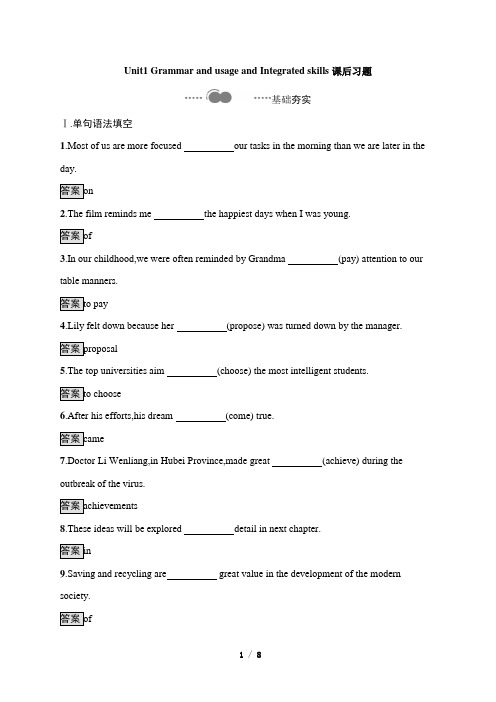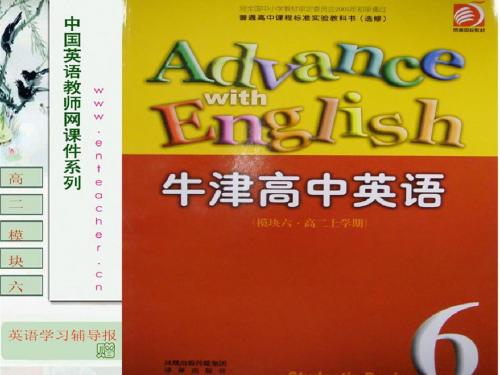Book 6_U1_Grammar and usage
译林版高中英语必修三Uint1 Grammar and usage (II) 教案(雅礼版)

Unit 1 Nature in the balanceGrammar and usage (II)Ellipsis◆内容分析:本板块围绕单元话题,以“环保纪录片和环境志愿者活动”创设情境,引导学生在谈论关于环境保护的纪录片的对话中观察、探究省略这一语法现象,并自主归纳其核心语法规则;接着通过单句和语篇两个层面的练习巩固所学、内化新知;最后要求学生正确运用省略这一语法规则创作几条环保宣传语。
◆教学目标:By the end of this section, students will be able to:1.learn about the functions of ellipsis;2.summarize the general rules of ellipsis;3.apply the rules of ellipsis in the context.◆教学重难点:1.To summarize the general rules;2.To apply the rules correctly and properly.◆教学过程:Step 1 Review—Homework checking1. —Have you seen this film?—Yes, I have seen it.2. —Will the performance be put off till next week?—I hope it will not be put off till next week.3. The emperor cannot break his promise, although he would like to break his promise.4. You can watch the documentary or you can watch the feature film.5. The opera house looks grander now than it did when I visited it last year.6. In the Amazon rainforest, you can see many plants known to us and you can see thousands of animals.7. When she was alone, she often felt anxious and uncomfortable.8. I want to do something to help protect endangered animals, but I don't know how to help protect them.9. The boy could not go out to play basketball, even though he wanted to go out to play basketball.10. I like dancing more than I like singing.Suggested answers:1. —Have you seen this film?—Yes, I have (seen it).2. —Will the performance be put off till next week?—I hope (it will) not (be put off till next week).3. The emperor cannot break his promise, although he would like to (break his promise).4. You can watch the documentary or (you can watch) the feature film.5. The opera house looks grander now than (it did) when I visited it last year.6. In the Amazon rainforest, you can see many plants known to us and (you can see) thousands of animals.7. When (she was) alone, she often felt anxious and uncomfortable.8. I want to do something to help protect endangered animals, but I don't know how (to help protect them).9. The boy could not go out to play basketball, even though he wanted to (go out to play basketball).10. I like dancing more than (I like) singing.【设计意图:复习巩固。
译林版高一英语必修第一册(2019版)_Unit1_Grammar_and_usage_课后习题

Unit1 Grammar and usage and Integrated skills 课后习题基础夯实Ⅰ.单句语法填空1.Most of us are more focused our tasks in the morning than we are later in the day.2.The film reminds me the happiest days when I was young.3.In our childhood,we were often reminded by Grandma (pay) attention to our table manners.4.Lily felt down because her (propose) was turned down by the manager.5.The top universities aim (choose) the most intelligent students.6.After his efforts,his dream (come) true.7.Doctor Li Wenliang,in Hubei Province,made great (achieve) during the outbreak of the virus.8.These ideas will be explored detail in next chapter.9.Saving and recycling are great value in the development of the modern society.10.If you follow me,you will make greater (succeed).11.(profession)spent more time on the research.12.They asked me to design a (post) for the activity.Ⅱ.短语填空1. the heavy rain,the football match was put off.2.After his retirement,he can his personal interests.3.Whatever happens,we’ll our promise.4.His dream of becoming a university teacher has .5.You’ll be able to choose a room your own personal taste.6.Even if the child’s access to schooling is difficult,you should not .7.To our satisfaction,his efforts on his children will .8.We to be there around six.Ⅲ.完成句子1.他们成功地克服了各种困难。
牛津英语M6unit1Grammar and Usage

Translation:
• 我叔叔从不来看我们。
• My uncle never visits us.
• 这儿很少下雪。
• It seldom snows here.
• 你老师给你们测验吗?
• Does the teacher ever give you tests?
Story-telling:
The true author of the book remains unknown.
Does life exist on Mars.
4.表示占有与从属的动词,如 have, possess, own, contain, belong to, consist of, form等
She possesses some valuable jewels. The United Kingdom consists of Great Britain and Northern Ireland.
Further study:
• Who is going to cook the meal? • Don’t mention this when you are talking about this problem. • If she is still waiting there when you see her, tell her to go home. • While you are traveling there, you must visit these places. 常用表示将来发生的事
…to talk about things that are true now or always true. (客观事实或 普遍真理)
• The Academy Awards show is on television every year. • Every time a prop comedian tells a joke, he or she uses a thing, called a prop. …to talk about things that occur regularly.(经常发生的事情 )
Unit+1+Grammar+and+Usage+句子成分和结构牛津译林版(2020)必修第一册

时间状语
• I was late because of the traffic jam .
原因状语
• We'll send a car to fetch you.
目的状语
• The fish can eat a person in two minutes, leaving only bones.
结果状语
② He seems interested in the book. 么”,
“怎么样” 。
③ Silk feels soft and smooth.
④ The weather becomes cool.
⑤ She always stays calm when facing danger.
⑥ The truth is that he is missing.
系动词分类
1) 表状态的be动词:be,is,am,are,was,were 2)表感官的动词: look, sound, taste, smell, feel, 3)表变化的动词: become, get, turn, go,grow,come 4)表持续的动词: remain, stay, keep, continue 5)表表像的动词: seem, appear (似乎,好像) 6)表终止的动词: prove, turn out(证明)
基本句型三 主+谓+宾语+宾语补足语
① You make me happy. ② They call me John. ③ We should keep the table clean. ④ The noise drives me crazy. Conclusion: 动词虽然是及物动词,但是只跟一个宾语还不能表 达完整的意思,必须加上一个补充成分来补足宾语,才能使意思 完整。
《Grammar and usage》 知识清单

《Grammar and usage》知识清单一、词类(Parts of Speech)1、名词(Noun)普通名词(Common Noun):如“book”(书)、“table”(桌子)。
专有名词(Proper Noun):如“China”(中国)、“Tom”(汤姆)。
可数名词(Countable Noun)和不可数名词(Uncountable Noun):可数名词有复数形式,如“apples”;不可数名词没有复数形式,如“water”。
2、动词(Verb)及物动词(Transitive Verb)和不及物动词(Intransitive Verb):及物动词后需接宾语,如“eat an apple”;不及物动词后不接宾语,如“sleep”。
动词的时态(Tenses):包括一般现在时(Simple Present Tense)、一般过去时(Simple Past Tense)、一般将来时(Simple Future Tense)、现在进行时(Present Continuous Tense)、过去进行时(Past Continuous Tense)、现在完成时(Present Perfect Tense)、过去完成时(Past Perfect Tense)等。
3、形容词(Adjective)形容词用于描述或修饰名词,如“beautiful girl”(漂亮的女孩)。
形容词的比较级(Comparative Degree)和最高级(Superlative Degree):如“taller”(更高的)、“the tallest”(最高的)。
4、副词(Adverb)副词用于修饰动词、形容词或其他副词,如“run fast”(跑得快)、“very beautiful”(非常漂亮)。
副词的比较级和最高级:如“more carefully”(更仔细地)、“most carefully”(最仔细地)。
5、代词(Pronoun)人称代词(Personal Pronoun):如“I”(我)、“you”(你)、“he”(他)等。
译林版高中英语选择性必修二Unit1 Grammar and usage 练习(雅礼版)

选择性必修二Unit 1 The mass media语法补充练习:过去完成时一、过去完成时的应用1.与过去完成时连用的时间状语可以多种多样,使用它的主要依据是看其是否发生在“过去的过去”。
在来这儿之前我学过一些英语。
I had learned some English before I came here.到去年他已经写了三篇故事。
He had written three stories by the end of last year.当他到那儿时,我们已经把房子弄干净了。
We had cleaned the house when he got there. 2.过去完成时还经常用于主句为过去时的宾语从句中。
他说他当过兵。
He said he had been a soldier.3. 动词expect, hope, suppose, think, want等的过去完成时可用来表示未实现的计划、打算或希望。
我本希望来看你。
I had hoped to visit you, but...他本想在北京买栋房子。
He had meant to buy a house in Beijing, but ...4.用于下列4个特殊句型中:1)hardly … when … , / no sooner … than …2)It/ That /This was the first time that …3)It was+时间段+since …4)… than sb. had thought /expected /hoped /wanted等。
我刚开开门,他就告诉了我。
Hardly had I opened the door when he told me the news.他刚买了这辆车,转眼又卖了。
No sooner had he bought the car than he sold it.这是他第二次和她一道出去。
Book6_U1教案4Grammarandusage
牛津高中英语教学设计教材:牛津高中英语(模块六)高二上学期文档内容:教学设计—教案单元:Unit 1 Laughter is good for you板块:Grammar作者:刘青Thoughts on the design:本节课是一节语法复习课。
因为非谓语动词学生都已经学过,本堂课主要由教师引导学生回顾非谓语动词作主语、定语和宾语补足语的用法和含义,再配以相应的练习和活动确保学生对非谓语动词这几项功能的掌握和正确运用。
Teaching aims:After this class, the students will be able to1. tell the differences between “to do” and “doing”;2.express their opinions using the verb forms;e non-finite in exercises correctly.Teaching procedures:Step 1 lead in (PPT4-5)Give the students a sentence “Laughter is good for our health. So l love comedies. With everything prepared, I will perform in the comedy to be put on this weekend. Acting in a drama will be an unforgettable experience. ” and ask “What are the functions of the parts in red?”They are: object complement, attributive and subject.What is the grammatical term for the three verb forms? —non-finite[Explanation]因为学生在模块五刚系统地学习了非谓语动词的含义和用法,对此还比较熟悉,直接用语境让他们识别,自然的引出现在非谓语动词的几个形式。
外研版 必修一 unit 1 Grammar and usage教案
Period 2 Grammar and usageTeaching aims:1.Consolidate the Ss’knowledge about the grammar items-----present simple tense &present continuous tense.2.★(for Class 6&7)Explain verbs ending in –ed used as adverbial to the Ssand have them learn to use it to make sentences.Teaching importance: the usage of the first two grammar items.Teaching difficulty: the usage of –ed used as adverbial.Teaching methods: cooperation & discussion, explanation and practice.Teaching steps:Step 1: General introduction1.Revision of the present tenses.Warming upWarming up by reading, turn to page 4 and do the exercises.1) Read the sentences and answer the questions.2) Read the passage again. Choose 3 sentences in the present simple tense and two in the present continuous tense. Say which uses they show.Summary about the present tenseWe’ve studied the present tenses in junior school in the past, let’s have a revision about the tenses in brief. When and where to use the present tenses is the most important point. Now, we have a conclusion:1)To denote present habitual action (表示现在习惯性行为)We go to school at seven o’clock every day.Bill often drinks heavily every night.2)To denote present state. (表示目前存在的状态)Honesty is the best policy to solve problems.Water consists of hydrogen and oxygen.3)To denote an objective truth.(表示客观真理)The earth is round and moves around the sun.Knowledge is power.4)To denote future actions sometimes.(有时指将来)I’ll let you know as soon as I hear from her.The plane leaves for Miami at eight o’clock tonight.高考链接1) The house could fall down soon if no one ____ some quick repair works.(2004)A. has doneB. is doingC. doesD. had done2) Come and see me whenever ____. (2003 北京)A. you are convenientB. you will be convenientC. it is convenient to youD. it will be convenient to you3) He will have learned English for eight years by the time he ____ from the university next year.(2002 上海)A. will graduateB. will have graduatedC. graduatesD. is to graduate4) I ____ ping-pong quite well, but I haven’t had time to play since the new year. (NMET 2001)A. will playB. have playedC. playedD. play5) --You are drinking too much.--Only at home. No one ____ me but you. (2000 北京)Warming up1) Warming up by reading My First Day at Senior High again and underline the adjectives with–ing or –ed endings.2) Warming up by choosingA. The –ing form describes characteristics of thingsB. The –ed form describes the characteristics of peopleC. The –ing form describes the people or things that cause the feelingYou may see the –ing or –ed forms of verbs from time to time in our reading materials used as adjectives as predicative to express the characteristics of something or somebody, but do youTheir regulation in usage can be shown in following patterns:sb. + be + -ed (the –ed form describes people)sth. + be + -ing(the –ing form describes things)高考链接I used to play ping-pong a lot in my spare time, but now I’m interesting in football. (1997Step2: Exercises for consolidation1. Exercises for the present tense1. I ____ to have another try if I can get another chance.A. have been meaningB. meanC. am meaningD. meant2. ____ your broken leg.A. Do be careful ofB. Do care forC. Be carefulD. To be care full to3. It’s the third time that you ____ late for school this week.A. wereB. areC. had beenD. have been4. I won’t go home until I ____ the job.A. have doneB. had doneC. have beenD. are5. These kinds of shoes ____ well.A. don’t sellB. are not sellC. won’t be soldD. were not sold6. A quarrel ____ between the two neighbors.A. broke outB. was broken outC. is breaking outD. is broken out7. How long do you think the meeting ____ ?A. lastsB. will lastC. is lastedD. is lasting8. Our school yard ___ an area of 1,500 square meters.A. coversB. is coveredC. extendsD. is extended9. While this tough meat is being cooked, more water should ____ it.A. add toB. be added toC. had been added up toD. will be added to10. They left for Beijing last week and we ____ them so far.A. don’t hear fromB. didn’t hear fromC. haven’t heard fromD. won’t hear from11. You are very busy. I ____ you ____ hard for your experiment.A. suppose, are workingB. am supposing, are workingC. am supposing, workD. suppose, work12. My brother ____ a lot. He ____ a new novel at the moment.A. reads, readsB. reads, is readingC. is reading, is readingD. is reading, read13. Perhaps it will be a long time ____ from abroad.A. when Tom comes backB. when Tom will come backC. before Tome comes backD. that Tom comes back14. There ____ the bus. Harry up.A. is comingB. comeC. comesD. had come15. If you ____ over there for a moment, the manager will be here soon.2. Exercises for the participlesTranslate the following into English by using the–ing or –ed forms of verbs. They are used not only as predictive but also as complements of object, but the regulation is similar.1)你讲的这个事情很有意思。
新教材 高中英语 必修第一册 译林牛津版 UNIT 1 Grammar and usage
完成句子
(3)Jenny nearly missed the flight
as a result of (由于)doing too much shopping.
4 come true 实现
His dream of making a difference to his family came true. 他改变家庭的梦想实现了。[词汇复现]
bring sth. into focus 使某事成为焦点
in/out of focus 焦点对准/ 没有对准
The incident brought the problem of violence in schools into focus.
这次事件使校园暴力问题成为焦点。
(2)vt. & vi. 集中
完成句子 (1)The designer didn’t want to
go into detail((s)详谈)about the design related to the
new building. (2)We’d better discuss everything
in(d详eta细il 地) before we work out a plan.
(1)[词汇复现]He worked very hard. As a result, he had his English improved.
→ He had his English improved
as a result of working hard.
(2)He was lazy so he failed.
realize 是及物动词,后接宾语,可用于被动语态
单句语法填空
(1)[词汇复现]With all his attention focused (focus) on his research,his dream came (come)true at last.
Unit+1+Grammar+and+usage+课件-高中英语牛津译林版(2020)必修第三册
作GreenHope 的同位语, be devoted to sth/doing 致力于…wh…at的if+句子?假使……将会怎么样?
stop/prevent/keep people from doing阻止某人做某事
a地bs;olu极ctlee其大layn;捞aud专p一v.清制绝笔理地对;;,地收整独,割治裁完;地全 absolute adj. 完全的,纯粹的; 绝对的;专职独裁的;独立的
overcome her difficulty.
11.To the couple’s great surprise, the house was in a mess as if
(break)into.
12. Time, when
(use) correctly, is money in the bank.
job. 5.treated 考查条件状语从句的省略,补充完整后为 unless finger sucking/it is treated properly。 6.directed 考查方式状语从句的省略,补充完整后为as they are directed。
pared 考查时间状语从句的省略,补充完整后为when it is compared with.... 8.as/so 考查比较状语从句的省略,补充完整后为as/so strong as yours is. 9.surprised 考查让步状语从句的省略,补充完整后为 Though the professor was surprised to see uso 10.Were 考查 If 虚拟条件从句的省略,补充完整后为 If it were not for.... 11.broken 考查方式状语从句的省略,补充完整后为 as if it was broken into. ed 考查时间状语从句的省略,补充完整后为 when it is used correctly.
- 1、下载文档前请自行甄别文档内容的完整性,平台不提供额外的编辑、内容补充、找答案等附加服务。
- 2、"仅部分预览"的文档,不可在线预览部分如存在完整性等问题,可反馈申请退款(可完整预览的文档不适用该条件!)。
- 3、如文档侵犯您的权益,请联系客服反馈,我们会尽快为您处理(人工客服工作时间:9:00-18:30)。
in
Laughter is good for our health. So l love comedies. With everything prepared, I will perform in the comedy to be put on this weekend. Acting in a drama will be an unforgettable experience.
2. The play ___________(direct) by Tom is directed very interesting. 3. Before the New Year, we had our house __________(clean). cleaned
playing 4. It is no good ___________(play) too much computer game.
We had the job finished on time.
Conclusion 1 to do—an action that has finished (the whole process) Doing—an action that is taking place Done—an action with passive meaning Conclusion 2 We use object complement after certain verbs: feel, hear, notice, listen to, see, observe, smell, watch, have, leave, etc.
v-ed—passive meaning / complete action
v-ing—active meaning/ continuous action
to do—action that will happen in the future
Practice: The building _______________(build) to be built next year will be a new school. being built The building ___________________ (build) now will be a new school. The building _________________ (build) built last year is a new school now.
To see is to believe. Laughing helps your body stay healthy and can even help you fight pain.
In the following sentence pattern, we use “to do” as the subject: It is + adj. + (for sb.) to do
Conclusion 1 is also fit in the following structure: With + n. + object complement Have a try: (use the correct form of “solve”)
to solve
With a lot of problems _______________, the boss is worried. solved With a lot of problems _______________, the boss is very happy. solving With a lot of experts _______________ the problems for him, the boss is relaxed.
1. The movie to be issued next month is said to be very interesting. 2. The book published last month is an interesting one.
When we use non-finite as attributives:
What are the functions of the parts in red?
Object complement
Attributive
Subject
—Non-finite
Filling the blanks using the correct verb forms. 1. In my opinion, it is important _________(learn) English well. to learn
牛津高中英语
(模块六 · 高二上学期)
Unit
1
Grammar
infinitive, verb-ed and verb-ing (I)
板块:教学设计—课件 作者:刘 青
Unit 1
课件描述:
本课件帮助学生复习非谓语动词作 主语、定语和宾语补足语时候的一些用 法和注意点,并辅以一定的练习和活动 帮助学生在相应的语境中运用非谓语动 词。
When I passed him, I heard him singing.
I found him hurt in the accident.
2. The boss had him carry out the difficult task.
He had the little boy waiting for three hours.
Study the following sentences and tell the difference between “(to) do”, “doing” and “done” as object complement. 1. We saw him dance in the street yesterday.
1. Part A
2. Part B
Work in groups of four. Make up a short story using non-finite. You should at least cover 6 non-finite verbs of different functions.
Compare the sentences and find out the difference between “v.-ed” and “v.-ing” as attributives. 1. The case belonging to Tom looks very strange.
2. The box wrapped in colored paper looks strange.
5. The librarybeing ___________(build) now will be built completed next month.
The to infinitive is often used as the subject of a sentence. When we talk about a general idea, we sometimes use verb-ing as the subject.
But in the pattern
“It is no use/ no good doing” we use “doing” as the subject. eg. It is no use copying all the words down. It is no good arguing with him.
